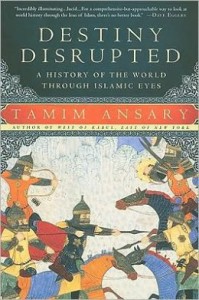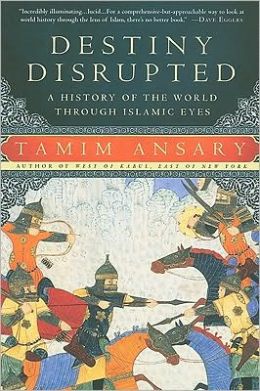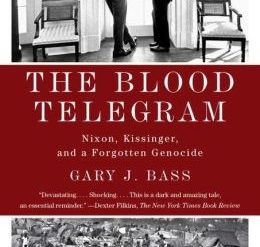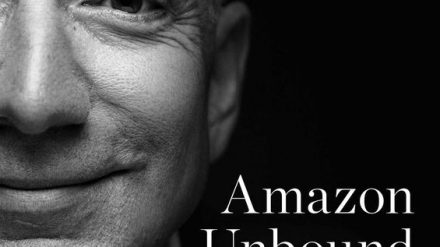
It seems remarkable to me that Destiny Disrupted is the first new global history written from an Islamic perspective that has come to my attention in the fourteen years since 9/11. After all, analyses of events in what we call the Middle East frequently emphasize that Muslims perceive the world through a lens shaped by different values. Here, then, is an accessible, popular history that goes a long way toward illuminating those differences for the lay reader.
For starters, Ansary notes what should be obvious to any Westerner who isn’t blinded by ethnocentricity: what we typically call the Middle East is east of nothing to people who live there. Ansary prefers to call the region “from the Indus to Istanbul the Middle World, because it lies between the Mediterranean world and the Chinese world.”
Three Three “worlds” on the globe
From a geopolitical perspective, the center of gravity in the Middle World has shifted back and forth among three poles: Mesopotamia, where history began; Persia, where empires rivaling Rome were founded; and Turkey, a latecomer peopled by invaders from the plains of Central Asia and later alternating between Muslim and Christian rulers. As Ansary writes, “We often hear of Alexander the Great conquering the world, but what he really conquered was Persia, which had already conquered ‘the world.'”
Destiny Disrupted: A History of the World Through Islamic Eyes by Tamim Ansary (2009) 416 pages ★★★★☆
The Middle World as a whole (and, for that matter, the West as well) interacted very little with the Chinese world. Most of “history” — the friction between the Middle World and the West — cropped up along the narrow strip of Mediterranean coastland that includes today’s Lebanon, Israel, Syria, and Jordan. To put today’s events in historical perspective, the grim developments of recent years in that area mirror thousands of years of historical conflict.
Islamic theology explained
The fundamental difference between Islam and Christianity is profound. Ansary explains that “instead of focusing on isolated individual salvation, Islam presents a plan for building a righteous community. Individuals earn their place in heaven by participating as members of that community and engaging in the Islamic social project, which is to build a world in which orphans won’t feel abandoned and in which widows won’t ever be homeless, hungry, or afraid.”
It was said in 2002 in the run-up to the US invasion of Iraq that President George W. Bush (perhaps apocryphally) was unaware that Sunni and Shi’i represented firmly opposed brands of Islam — far more deeply divided than Roman Catholics and Protestants. (Sunni and Shi’i continue to kill one another; Christians pretty much stopped doing that centuries ago.) Regardless of whether this claim is true of the former president, it certainly was true (and probably still is) of a majority of Americans. Destiny Disrupted explains those differences beautifully (even if it fails to make the violence surrounding them understandable).
The divisions among Muslims
As in every other major religion, however, the contrast between Sunni and Shi’i is only the most superficial pattern of diversity. Just as Christianity encompasses hundreds (if not thousands) of different theological perspectives, and speaking of the divisions among Orthodox, Conservative, and Reform Jews dramatically oversimplifies the reality, Islam, too, has experienced a multitude of breakaway sects and tendencies.
If you want an eminently readable introduction to these distinctions, and a guide to the meaning of those seemingly opaque leadership titles (caliph, imam, sultan, ayatollah), you’ll find it in this book. Ansary does an admirable job casting light on this (to Western eyes) obscure subject. He also explains the overarching principles of Islamic faith with great clarity.
The five pillars of Islam
Ever since Mohammed laid them out in the seventh century, Islam has rested on five pillars:
- “shahadah, to attest that there is only one God and Mohammed is his messenger;
- “salaat (or namaz), to perform a certain prayer ritual five times every day;
- “zakat, to give a certain percentage of one’s wealth to the poor each year;
- “sawm (or roza), to fast from dawn to dusk during the month of Ramadan each year; and
- “hajj, to make a pilgrimage to Mecca at least once in a lifetime, if possible.”
Ansary points out that these five pillars are all actions, not beliefs; even the first of them requires Muslims to “to attest.” He emphasizes, “Islam is not merely a creed or a set of beliefs; it is a program every bit as concrete as a diet or an exercise regiment [sic]. Islam is something one does.”
Tamim Ansary is an Afghan-born American writer and public speaker. He is also (obviously, given the subtitle of this book) a Muslim.
For further reading
I’ve also reviewed Ansary’s brilliant venture into Big History in 2019, The Invention of Yesterday: A 50,000-Year History of Human Culture, Conflict, and Connection by Tamim Ansary (Understanding human history as an extraterrestrial might view it).
This is one of the books I’ve included in my post, Gaining a global perspective on the world around us. And if you’re looking for a broader view of human history, check out New perspectives on world history.
It’s also one of 18 eye-opening books about terrorism.
You may enjoy browsing through 20 top nonfiction books about history. If you enjoy reading history in fictional form, check out 20 most enlightening historical novels.
And you can always find my most popular reviews, and the most recent ones, on the Home Page.



























